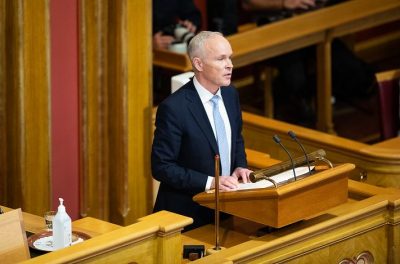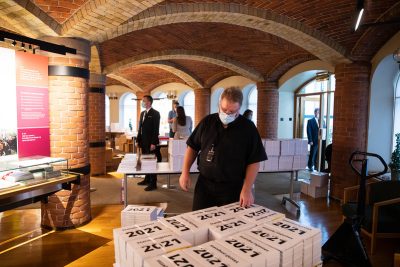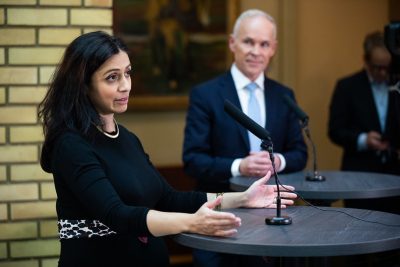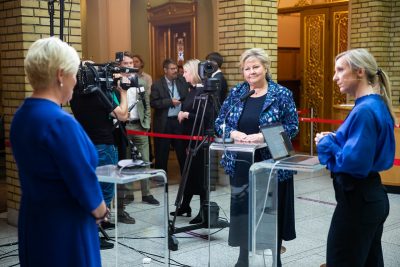Finance Minister Jan Tore Sanner presented his first state budget on behalf of the government on Wednesday, claiming it was aimed at bringing Norway out of the Corona virus crisis. Opposition parties led off by Labour briefly acknowledged how they’ve cooperated on doing just that, before attacking the proposed budget for allegedly increasing social differences and making the rich richer.

Financial markets, meanwhile, didn’t respond with any big gains or losses, a sign the budget proposal didn’t raise many big concerns. Sanner’s warning that “we must live with the Corona pandemic next year too” didn’t unduly jar the Oslo Stock Exchange, and the value of the Norwegian krone mostly held its own in the hours after the budget was released.
Sanner stressed that the state budget proposal for 2021 offers measures to “get folks back to work,” boost labour competence, maintain and create jobs, include more people in the work force and preserve safety, health and welfare. He doesn’t intend, however, to use lots more of Norway’s oil money to that.
The government proposes padding the state budget by pulling NOK 313.4 billion out of Norway’s Oil Fund next year, nearly NOK 91 billion less than this year. The amount also brings the government back to the general rule for use of Norway’s oil fortune: Just 3 percent of the fund’s total value. That’s the normal limit set on withdrawals from the Oil Fund, after a Corona crisis year during which that limit was exceeded.
Tougher times ahead
Commentors quickly noted how that’s surprisingly ambitious and optimistic, and a sign of tougher times ahead. At the very least, the opposition won’t be able to accuse the government of using too much oil money to cover up for a deficit. Few objected to how the government dipped much more deeply into the Oil Fund during this past extraordinary year, when emergency aid was doled out to businesses and people hit hardest by the Corona crisis. Now it may be opposition politicians who demand more oil money be used, if the government’s budget priorities aren’t otherwise changed.

That’s unlikely, and with fewer bailouts and less emergency aid, more businesses may go bankrupt. Cecilie Langum Becker, economics commentator for state broadcaster NRK, predicted that some jobs also may be lost forever, if and when faltering companies don’t ever get back to normal. The government also proposes ending its recent extension of unemployment benefits from next summer, when many hope the crisis will have eased or be over.
The government simply doesn’t want to continue direct handouts or bailouts, opting instead for incentives to restructure Norway’s economy, create new jobs and boost personal competence. The government is calling on Norwegians to lær hele livet (learn your whole life) and gain new job skills, as digitalization also forces major changes in how people live and work.
The goal, according to Sanner, is what he calls “getting back to sustainable use” of Norway’s oil wealth. He also stated in his speech to Parliament Wednesday that Corona “is changing our habits,” resulting in, for example, less travel and more use of home offices. The budget’s underlying message, Becker believes, is that Norwegians can’t rely on the state to pay for restoring everything to as it was before the Corona pandemic.
Immediate complaints
That presents at least one major political difference between Sanner’s Conservatives-led government coalition and a rival left-center coalition led by the Labour Party. Labour’s financial spokesperson, Hadia Tajik, immediately complained about proposals that will, for example, leave Norwegians paying a higher portion of their heavily subsidized health care costs “right in the middle of a pandemic.” She also lashed out at higher day care prices and criticized Sanner for lowering some taxes for the wealthy, claiming that his budget as a whole will widen the gap between rich and poor, not narrow it.
Another big budget battle will be over Norway’s high taxes on alcoholic beverages, tobacco and items containing sugar. They’ve long sent Norwegians driving over the border to shop in Sweden, where such taxes (called avgifter in Norwegian) are much lower. Many politicians and business owners, especially those in towns close to the border, have urged lowering the taxes to discourage what they call “trade leakage” to Sweden, the value of which has become glaringly apparent after Corona quarantine demands prevented Norwegians from crossing the border or shopping at airport duty-free outlets.

The proposed budget for next year, however, calls for increases of at least 3.4 percent in taxes on tobacco and alcoholic beverages. That would bring in even more tax revenues, since sales at Norway’s state-controlled liquor stores Vinmonopolet increased 32 percent in the first half of this year. The jump amounted to fully 49 percent at Vinmonopolet stores in Viken, the southeastern county that borders on Sweden.
The government is only offering to reduce taxes on some sweetened soft drinks, in an effort to placate the Progress Party. That’s expected to especially lead to a battle with Progress, which also opposes proposed tax hikes on gasoline at the pump and airline travel. The government, meanwhile, also wants to make it more expensive to buy hybrid or electric cars, which have long enjoyed huge tax breaks. Electric car owners will now need to pay the same at motorcycle owners, NOK 2,135 a year, if the government gets its way.
Property taxes, however, will be limited to 4 percent of tax value but those with homes valued at more than NOK 15 million may have to pay fortune/wealth tax on 50 percent of market value, as opposed to 25 percent today. It may cost more to heat homes as well, with the government proposing another 3.5 percent increase in the general electricity tax. There’s also bound to be a big debate over Norway’s fortune tax on business owners, with the government wanting to lower it and the left-center parties objecting.
Still more Corona relief coming
Far from all Corona-related support will stop, however, with NOK 2.5 billion earmarked for the culture sector, NOK 1.33 billion more for job creation incentives and state welfare agency NAV, and continuation of support for those laid off because of Corona, at least until next summer. Local governments all over the country, charged with funding schools, elder care and local health care among other welfare service, will also be demanding billions to offset lost tax revenues and new Corona expenses such as virus testing. Oslo alone claims it needs at least NOK 2 billion, while Sanner only seemed to offer an extra NOK 4 billion in municipal Corona compensation for the entire country. Details of how much the state government will propose transferring to local governments are due later this month.
Prime Minister Erna Solberg said around NOK 25 billion will be earmarked for Corona measures in total. “We will do what’s needed to get Norway through the pandemic next year, too,” Solberg told newspaper VG before her government’s budget was presented on Wednesday. She wouldn’t detail, however, how the NOK 25 billion would be divvied out.

One thing is clear: Solberg and Sanner face major battles in Parliament throughout the autumn, until a final state budget is approved before Christmas. Now they have not only the left-center parties against them, they also have to deal with the right-wing Progress Party in opposition. Siv Jensen, who held Sanner’s finance minister’s post before she withdrew Progress from Solberg’s government in January, has threatened that Progress won’t protect the goverment now, especially not the positions taken by the Conservatives’ junior partners, the Christian Democrats and Liberals. Solberg in turn has promised Progress “considerable influence” over the budget and has already gone ahead with funding symbolic items like NOK 1.8 million to the anti-immigration organization Human Rights Services, which is also highly critical of Islam. Defense spending will be boosted much closer to NATO’s requested levels.
“I’m glad she (Solberg) said we have considerable influence,” Jensen’s deputy Sylvi Listhaug told newspaper Aftenposten last weekend. In addition to lower taxes, Progress wants more money for hospitals, elder care and pensionists, less for foreign aid and even fewer immigrants and asylum seekers allowed into Norway. Both Listhaug and Jensen plan to exert that influence in the weeks ahead, while the other opposition parties make their demands, too.
NewsInEnglish.no/Nina Berglund

